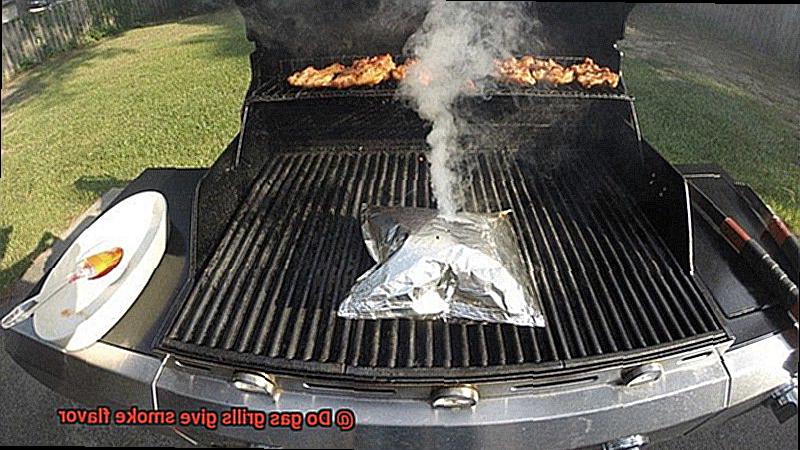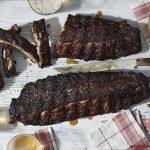Welcome to the sizzling debate among grill enthusiasts – can gas grills really deliver that mouthwatering smoky flavor we all crave? As summer heats up, the tantalizing aroma of perfectly grilled meats infused with the rich smokiness of charcoal grills becomes irresistible. But does convenience mean sacrificing flavor? Let’s dive into this fiery topic and explore the pros and cons of using gas grills for smoking.
Convenience is undoubtedly the star feature of gas grills. With just a twist of a knob, you can quickly fire up the grill and get cooking in no time. Plus, gas grills offer precise temperature control for consistent results. But what about that distinct smoky flavor charcoal grills effortlessly provide?
Charcoal grills create smoke by burning charcoal and wood chips, infusing food with that unmistakable smoky taste. Gas grills, on the other hand, lack direct combustion of solid fuel, leading some to believe they fall short in flavor. However, many gas grills come equipped with smoker boxes or flavor bars where you can add wood chips or pellets to generate smoke and achieve a hint of that beloved smoky flavor.
While gas grills may not reach the same level of intensity as charcoal grills when it comes to smokiness, they have their own unique advantages. One benefit is the ability to control the level of smokiness. Gas grills allow you to easily adjust the amount of smoke by choosing different types of wood chips or pellets, offering a more personalized flavor experience. Additionally, gas grills produce less ash and are easier to clean than their charcoal counterparts, making them a convenient option for those who value simplicity.
However, it’s important to note that some die-hard purists argue that true smoky flavor can only be achieved through direct combustion of charcoal. They believe that flavors from smoker boxes or flavor bars in gas grills simply don’t compare – lacking depth and complexity that comes from a charcoal-grilled feast.
Ultimately, the choice between gas and charcoal grills boils down to personal preference. If convenience and precise temperature control are your top priorities, gas grills can absolutely produce a delightful smoky flavor with the right techniques. But for those seeking an unmatched, intense smoky taste, charcoal grills may still reign as the champions.
In conclusion, while gas grills may not fully replicate the exact smoky flavor of charcoal grills, they offer their own unique advantages and can still deliver a satisfying hint of smokiness. So fire up
Contents
What is a Gas Grill?
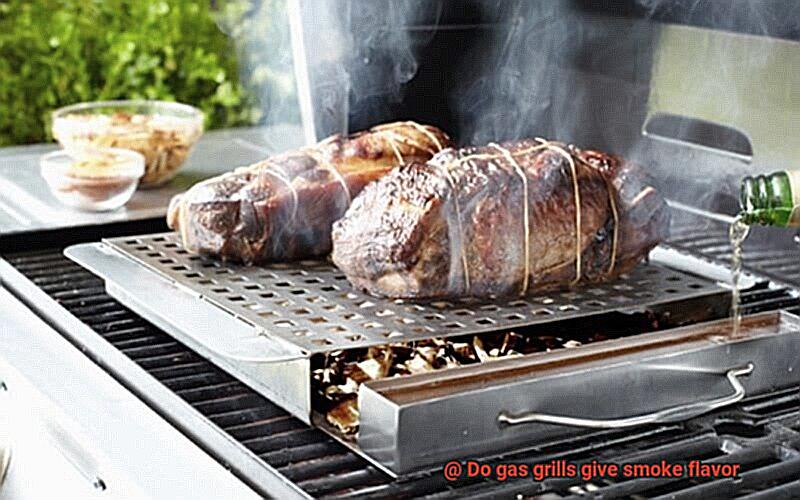
Step into the world of outdoor cooking and indulge in the sensory delight of sizzling food and tantalizing aromas wafting through the air. If you’re on the hunt for the ideal grill but find yourself torn between options, let us introduce you to the allure of gas grills. Gas grills offer a seamless and effortless way to elevate your grilling game, whether you’re a seasoned pro or an aspiring backyard chef. In this article, we will delve into the advantages, disadvantages, and key aspects of gas grills, enabling you to make an informed decision before your next unforgettable cookout.
Advantages of Gas Grills:
- Convenience: Unlike their charcoal counterparts that demand time and effort to ignite and maintain, gas grills spring to life with a simple push of a button or twist of a knob. No more waiting impatiently for charcoal to reach its optimal temperature; with a gas grill, you can start cooking almost instantaneously.
- Precision Temperature Control: Celebrated for their ability to provide precise temperature control, gas grills empower you to achieve culinary perfection with adjustable knobs or dials. Seamlessly sear steaks at high heat or leisurely slow-cook ribs at low temperatures – the choice is yours. With a gas grill, mastering the art of doneness has never been easier.
- Unleash Your Culinary Creativity: Many gas grills come equipped with additional features such as side burners, rotisserie attachments, and smoker boxes, expanding your cooking repertoire far beyond traditional grilling. Whip up delectable sautéed vegetables on the side burner, roast a succulent whole chicken on the rotisserie, or infuse your culinary creations with a touch of smoky flavor using the smoker box.
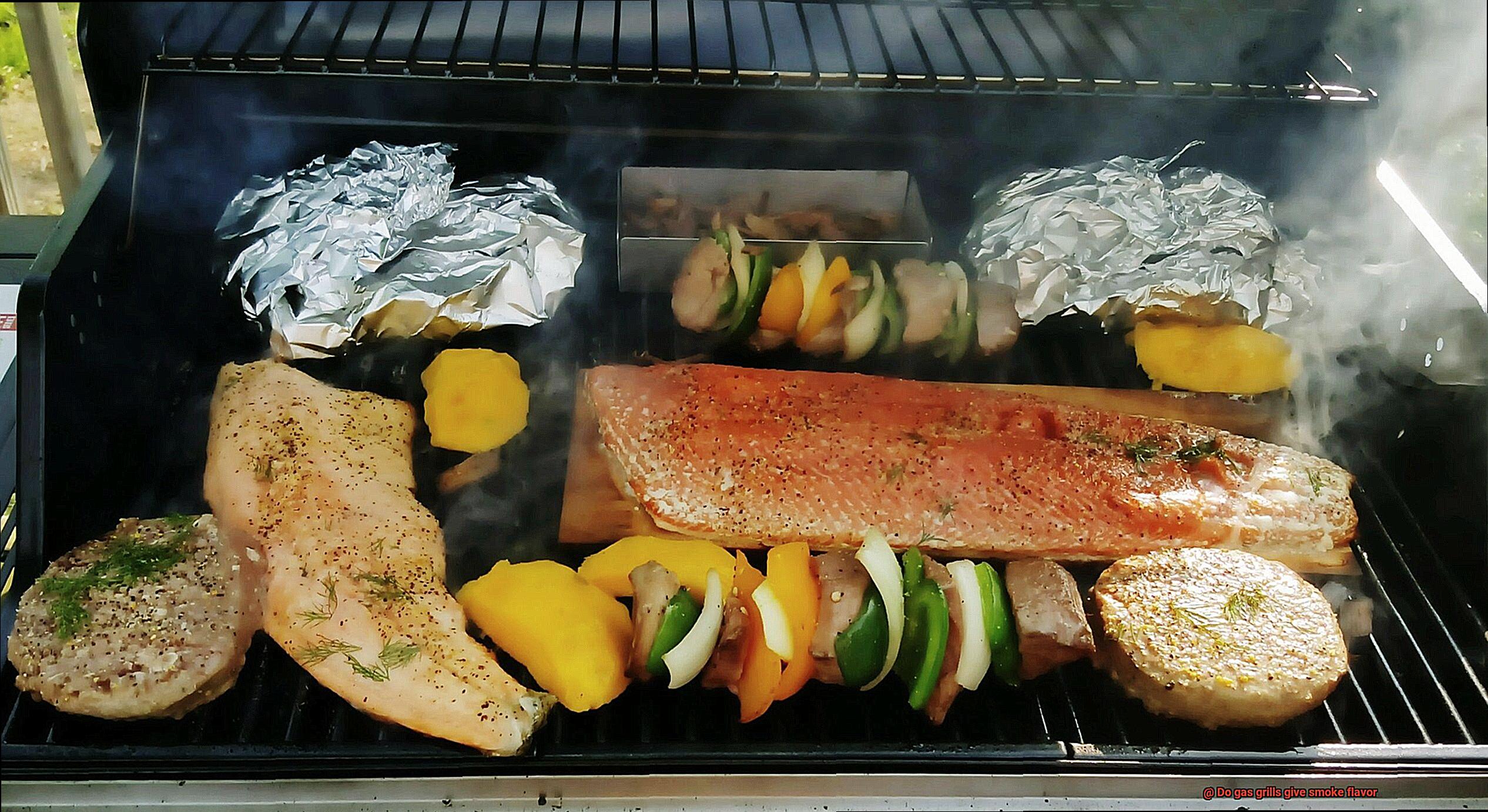
Disadvantages of Gas Grills:
- Unyielding Smoke Flavor: Gas grills, by their nature, do not impart the same intense smoky flavor as charcoal or wood-fired grills. However, innovative gas grills now offer built-in features or accessories that allow for the addition of smoky depth. Utilizing smoker boxes or wood pellets can infuse your food with a subtle yet gratifying smoky essence.
- Considerations for Portability: Gas grills tend to be bulkier and less portable compared to their charcoal counterparts. If you envision taking your grill on camping adventures or tailgating escapades, it’s essential to consider the size and weight of the gas grill you choose.
Safety Considerations:
Prioritize Ventilation: When utilizing a gas grill, ensuring proper ventilation is paramount to prevent the accumulation of carbon monoxide. Always grill in an open area, far from enclosed spaces or structures.
Do Gas Grills Give Smoke Flavor?
Gas grills have revolutionized outdoor cooking, offering convenience and precise temperature control. But what about that elusive smoky flavor that grill enthusiasts crave? While gas grills may not naturally produce the same intensity of smoky flavor as charcoal or wood-fired grills, fear not.
With a few techniques and accessories, you can still achieve a tantalizing smoky essence on your gas grill masterpieces.
Embrace the Power of Wood Chips:
Wood chips are the secret weapon for infusing a smoky flavor into your grilled foods. Soak them in water for at least 30 minutes to prevent them from burning too quickly. Once soaked, place the chips directly on top of the heat source or use a smoker box if your grill has one. As they heat up, the wood chips will begin to smolder and release that glorious smoke, enveloping your food in a delicate smoky aroma.
Smoke Boxes and Pouches:
For even more convenience, consider using a smoke box or pouch. These handy devices are filled with wood chips and placed on the grill grates alongside your food. As they heat up, they release a steady stream of smoke, imparting that desirable smoky flavor onto your culinary creations.
Explore Built-In Smoker Boxes and Dedicated Burners:
Some gas grills come equipped with built-in smoker boxes or dedicated burners designed specifically to generate smoke. These features give you greater control over the amount of smoke produced, allowing you to dial in the perfect level of smokiness for your dishes.
Enhancing Flavor with Marinades and Rubs:
To further enhance the smoky flavor of your gas grill creations, consider using marinades and rubs that incorporate ingredients like smoked paprika, chipotle powder, or liquid smoke. These flavorings can complement the subtle smokiness from the grill and create a well-rounded, savory taste.
Experiment with Different Types of Wood:
The type of wood you use can also impact the smoke flavor on your gas grill. Different woods, such as mesquite, hickory, or fruit woods like apple or cherry, impart distinct flavors that can elevate your grilled dishes. Play around with different wood varieties to discover your preferred smoky profile.
Smoker Boxes for Gas Grills
There’s an undeniable magic in the taste of smoky barbecue, that tantalizing aroma that dances through the air and tickles your taste buds. While traditional smokers and charcoal grills are renowned for their ability to infuse food with that distinctive smoky flavor, what if you’re a die-hard gas grill enthusiast? Enter smoker boxes, the secret weapon that brings the smoky goodness to your gas grill creations.
So, what exactly is a smoker box? It’s a nifty accessory crafted from durable stainless steel, designed to hold wood chips, pellets, or other smoking materials. Placed directly on the grill grates – over the burners or atop the heat diffusers – this little gem unleashes its magic when the grill is fired up. As the heat engulfs the box, the smoking material within begins to smolder, releasing clouds of mouthwatering smoke that permeate your food.
Convenience is one of the major advantages of using a smoker box. No need for separate smoker units or charcoal grills – this compact and user-friendly accessory has you covered. With a plethora of shapes, sizes, and features available, there’s a smoker box to suit every griller’s needs. Some boast perforated lids or side holes, ensuring optimal airflow and even smoke distribution. Others offer adjustable vents or dampers, allowing you to fine-tune the intensity of the smoke.
The versatility of flavors achievable with different types of wood chips or pellets is another major plus. Whether you crave the robustness of hickory, the sweetness of applewood, or the fruity notes of cherry, there’s a wood flavor to satisfy every palate. To ensure a slow smolder and ample smoke production, soak your chosen wood chips or pellets in water before placing them in the smoker box.
However, it’s essential to note that while smoker boxes can infuse your food with a hint of smoky goodness, the flavor may not be as intense or pronounced as what you’d achieve with traditional smokers or charcoal grills. The heat and direct flame of gas grills have the potential to overpower the delicate smoke flavor, resulting in a milder taste. To intensify the smokiness, consider experimenting with more wood chips or pellets, or even combining gas and charcoal grilling methods.
Wood Pellets for Gas Grills
I’m here to share the secret of using wood pellets in a gas grill to achieve that delectable smokiness.
Let’s dive into the basics. Wood pellets, typically used in pellet grills renowned for their rich and smoky flavor, can indeed be used in a gas grill. But how? It’s simple.
To infuse your gas grill with that delightful smoky taste, you’ll need a smoker box or a pellet tube. These nifty accessories allow you to contain the wood pellets and let them smolder, releasing their aromatic smoke. Place the smoker box directly over the burner or heat source, while the pellet tube can be nestled on the grill grates next to your tantalizing food.
But here’s the key: preheat your grill and let those wood pellets start producing smoke before adding your food. This ensures that the smoke flavor permeates every succulent bite. And speaking of flavor, different types of wood pellets offer an array of taste profiles. Whether you desire the robustness of hickory, the boldness of mesquite, or the subtle sweetness of fruitwood, there’s a wood pellet out there to suit your palate.
To amplify smoke production, soak the wood pellets in water for around 30 minutes prior to use. This douses them with moisture, helping them smolder and produce even more tantalizing smoke. Don’t forget to drain off any excess water before placing them in your smoker box or pellet tube.
Now, it’s important to note that using wood pellets in a gas grill may not yield as intense of a smoke flavor as a dedicated smoker or charcoal grill. However, it still offers an opportunity to elevate the taste of your grilled creations and achieve that sought-after smoky essence.
Infrared Burners and Smoke Flavor
When it comes to grilling, nothing beats the tantalizing aroma and mouthwatering taste of smoky goodness. Traditionally, charcoal or wood-fired grills have been the go-to for achieving that coveted smoky flavor. However, with the advent of infrared burners in gas grills, grilling enthusiasts now have another option to consider.
In this article, we’ll delve into the world of infrared burners and explore how they can be used to produce smoke flavor in gas grills.
The Science Behind Smoke Flavor:
Smoke flavor primarily comes from the combustion of wood chips, chunks, or pellets. When these materials are heated, they release flavorful compounds that infuse the food with that distinctive smoky taste. Charcoal and wood-fired grills excel in this regard because they allow direct contact between the wood and the food, facilitating maximum smoke absorption.
Infrared Burners: The Heat Masters:
Infrared burners are known as the heat masters of grilling. They generate high-intensity heat quickly and evenly, excelling at searing meats and achieving that desirable caramelized crust. However, on their own, they do not produce smoke. This is because they lack direct contact with wood or other combustible materials.
Enhancing Smoke Flavor with Infrared Burners:
While infrared burners may not produce smoke on their own, many gas grills with these burners offer additional features or accessories to enhance smoke flavor. Here are a few options:
- Smoker box or tray: Some models include a smoker box or tray where wood chips can be placed. These chips are then heated indirectly by the infrared burner, producing smoke that imparts a delicious smoky taste onto the food.
- Smoke box or pouch: Another option is to use a smoke box or pouch filled with wood chips placed directly on top of the infrared burner. As the burner heats up, it indirectly smokes the wood chips, infusing the food with that desired smokiness.
- Built-in smoke boxes or chambers: Special infrared burners with built-in smoke boxes or chambers also exist. These burners are designed to combine intense heat and smoke generation in one unit, providing both searing capabilities and smoky flavor.
Finding the Perfect Balance:
It is important to note that while gas grills with infrared burners can offer a level of smoke flavor, it may not be as pronounced as what you would get from a traditional charcoal or wood-fired grill. The intense heat produced by infrared burners can sometimes overpower the subtle nuances of smoke flavor. However, many grilling enthusiasts still appreciate the convenience and speed that infrared burners offer, even if they sacrifice a bit of smokiness.
Optional Smoke Generators for Gas Grills
These ingenious accessories are designed to infuse your food with that irresistible smoky flavor we all crave. So, let’s fire up the grill and explore how these smoke generators can transform your culinary adventures into mouthwatering masterpieces.
How do optional smoke generators work?
Optional smoke generators work their magic by producing aromatic smoke using wood chips, pellets, or other smoking materials. These generators are attached to your trusty gas grill and positioned near the heat source to efficiently generate that heavenly smoke.
Types of smoke generators:
- Smoker boxes: These compact metal containers hold wood chips or chunks and can be placed directly on the heat source or cooking grates of your gas grill.
- Smoker tubes: Picture cylindrical metal tubes filled with flavorful wood pellets or chips. Once lit, they’re nestled onto the cooking grates, allowing the smoke to gracefully escape through tiny perforations.
- Pellet smokers: These versatile devices utilize compressed wood pellets as fuel. Easily attached to your gas grill, they deliver both heat and smoke for an unparalleled grilling experience.
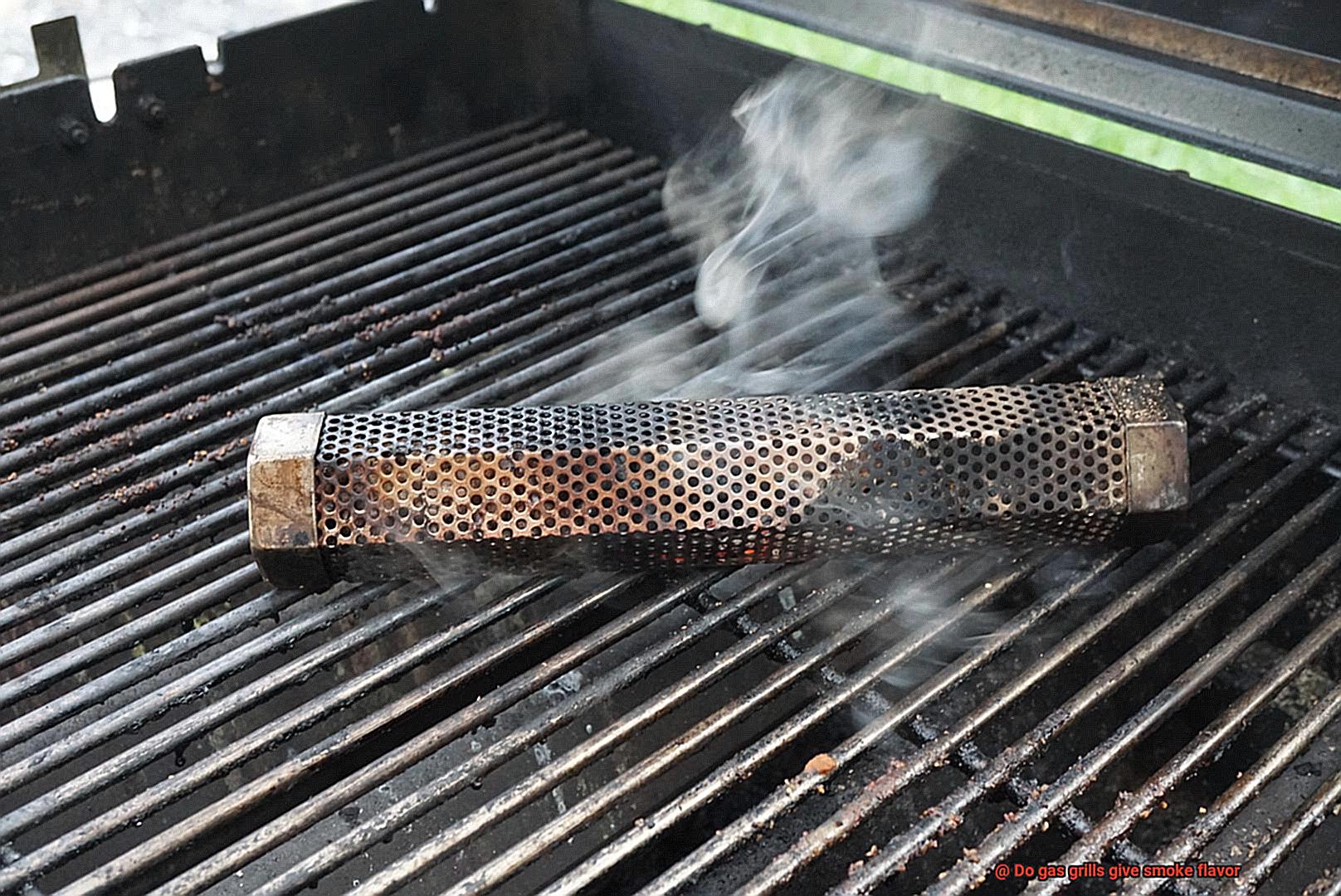
Choosing the right wood:
Unlock a world of flavor by selecting different types of wood. Experiment with hickory for a robust taste, mesquite for a bold kick, applewood for a hint of sweetness, or cherry for a touch of fruitiness. The choice is yours.
Tips for optimal results:
- Follow the manufacturer’s instructions for proper placement, lighting, and ventilation to ensure consistent performance.
- Adjust the duration of smoking based on your personal preferences – longer for a more intense smoky flavor, shorter for a subtler touch.
- Keep in mind that gas grills may not produce as strong of a smoky flavor as charcoal or wood-burning grills. However, optional smoke generators bridge that gap, allowing you to achieve that coveted smokiness.
Comparing Charcoal, Wood-Fired, and Gas Grills
When it comes to grilling, the choice of fuel can make a significant difference in the flavor, convenience, and versatility of your cooking. Charcoal, wood-fired, and gas grills each have their unique characteristics that cater to different preferences and priorities.
Flavor:
- Charcoal grills are renowned for their ability to produce a robust and distinct smoky flavor. The combustion of charcoal releases volatile compounds that infuse the food with a characteristic smokiness. The intensity of the smoke flavor can be controlled by adjusting the amount of charcoal and airflow.
- Wood-fired grills offer a similar smoky flavor, with the wood type influencing the taste profile. Different woods like hickory, mesquite, or applewood impart their own distinct flavors to the food. This versatility allows for experimentation with various wood flavors.
- Gas grills, while not known for producing smoke flavor on their own, can still achieve it. Smoker boxes or wood chips placed on top of the gas burners create smoke when heated, infusing the food with a smoky taste. Additionally, liquid smoke can be used as a convenient alternative.
Convenience:
- Gas grills are often favored for their convenience. They are easy to start and heat up quickly, allowing for faster cooking times. Gas grills also offer consistent heat distribution, ensuring even cooking throughout.
- Charcoal and wood-fired grills require more preparation and time to start and reach the desired temperature. They require fuel ignition and monitoring during cooking. However, some grill enthusiasts appreciate this process as part of the overall grilling experience.
Versatility:
- Charcoal grills are versatile in terms of cooking techniques. They allow for direct grilling over high heat or indirect grilling for slower cooking. Charcoal grills can also be used for smoking by adding wood chips or chunks for additional flavor.
- Wood-fired grills offer similar versatility to charcoal grills, with the added advantage of different wood flavors. The choice of wood can be tailored to the specific dish or desired taste profile.
- Gas grills provide versatility in terms of cooking techniques, such as direct grilling, indirect grilling, or even rotisserie cooking. With the use of smoker boxes or liquid smoke, gas grill users can still enjoy a smoky flavor while benefiting from the convenience and ease of use.
Tips for Adding More Smoke Flavor to Your Gas Grill
Gas grills are known for their convenience, but they often lack the smoky flavor that charcoal or wood-fired grills provide. Luckily, there are simple techniques you can use to add that delicious smoke-infused taste to your gas-grilled dishes. In this article, we will explore five tips to maximize the smoke flavor on your gas grill.
Soak Wood Chips for Extra Smoke:
Enhance the smokiness by soaking wood chips in water or your favorite liquid (beer, wine, or fruit juice). Soaking the chips for about 30 minutes adds moisture and prolongs their smoking time. Place the soaked wood chips directly on the heat source of your gas grill, such as on top of the burners or in a smoker box if available.
Try Different Wood Chip Flavors:
Each type of wood imparts a unique flavor profile. Mesquite offers a bold taste, while applewood provides a sweeter and subtler smokiness. Experiment with different wood chip flavors to find the perfect match for your grilled creations.
Create a Smoke Pouch:
If you don’t have a smoker box, create a simple smoke pouch using aluminum foil. Wrap the soaked wood chips in foil, poke holes for smoke release, and place it directly on the heat source. This method prevents flare-ups and allows for longer smoking time.
Utilize Smoking Tubes or Boxes:
Consider investing in smoking tubes or boxes designed specifically for gas grills. Fill these devices with wood pellets and place them on the grill grates. The steady and controlled release of smoke throughout the cooking process will infuse your food with a rich, smoky flavor.
Enhance with Aromatic Ingredients:
Boost the smoke flavor by adding herbs, spices, or aromatic ingredients to your grill setup. Place sprigs of rosemary or thyme on top of the wood chips or wrap a few cloves of garlic in foil. These additions will infuse extra flavors into your food, elevating the overall taste.
TOIK-BEY8PI” >
Conclusion
In conclusion, gas grills do not provide the same level of smoke flavor as charcoal or wood-fired grills.
While they can produce a hint of smokiness through the use of wood chips or smoker boxes, it is often not as pronounced or authentic. Gas grills are designed for convenience and speed, allowing you to cook your food quickly and efficiently.
These grills offer a more intense and distinct smoky taste that cannot be replicated by gas grills alone.

